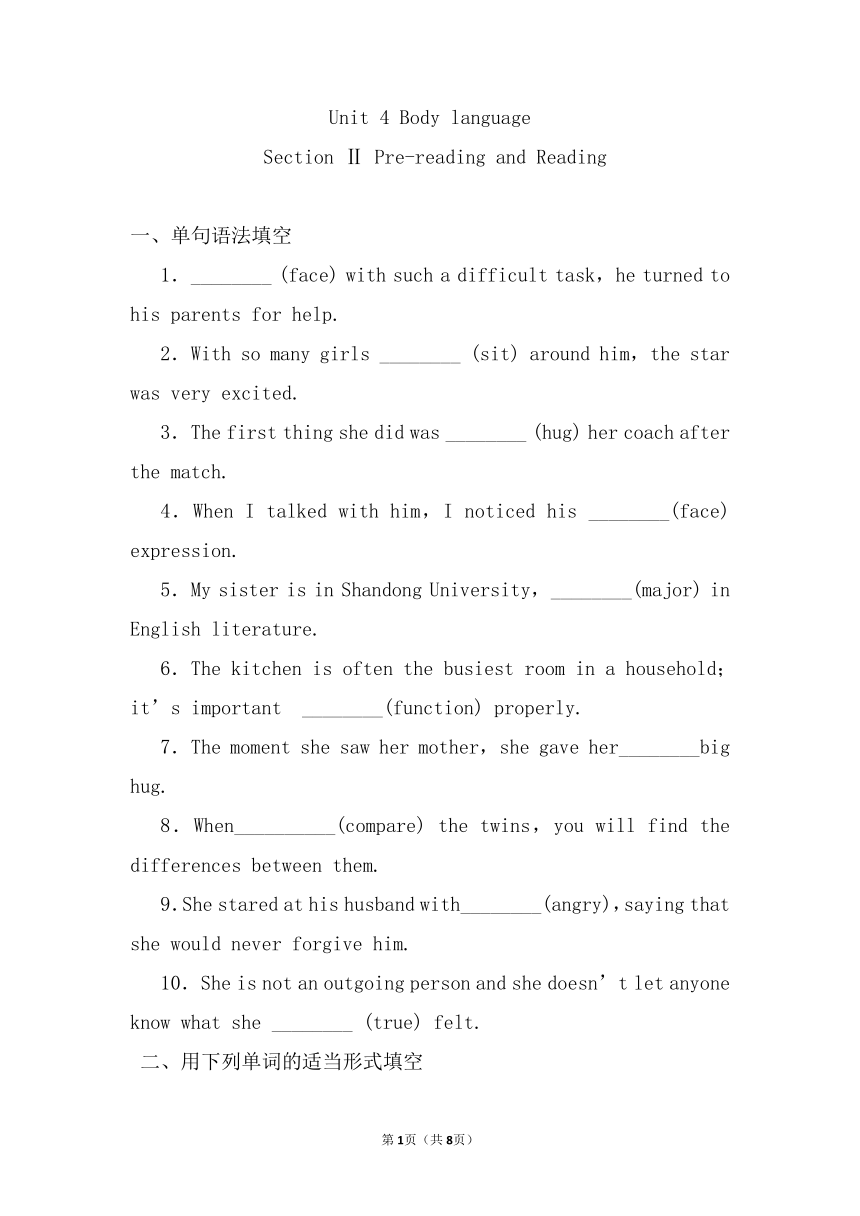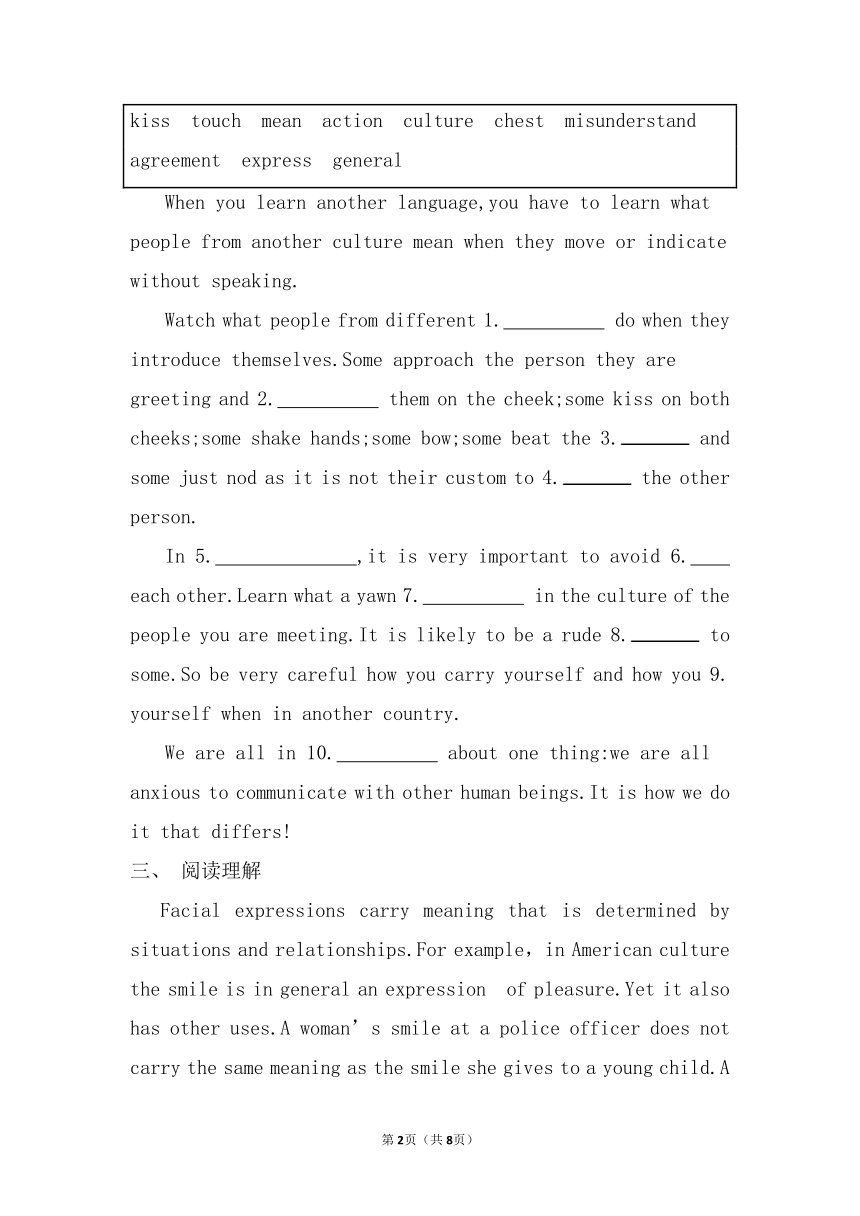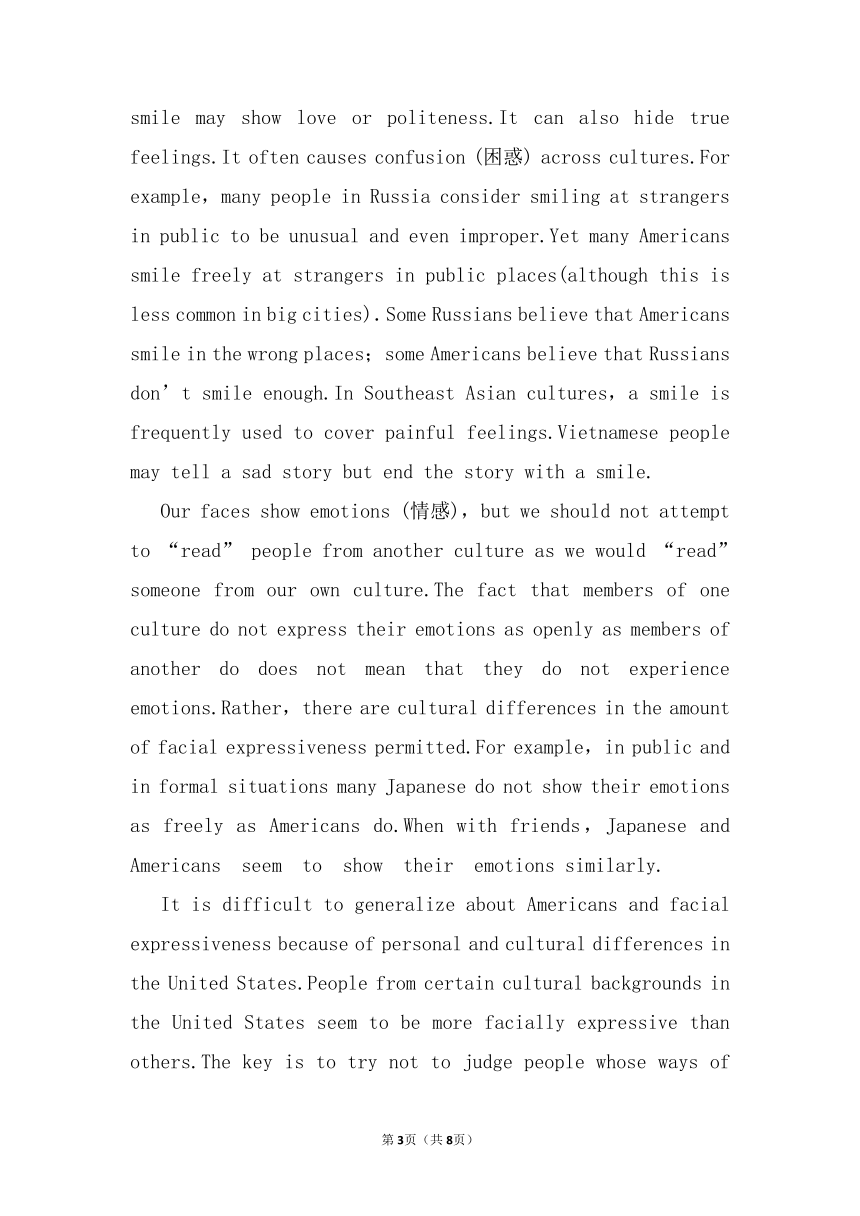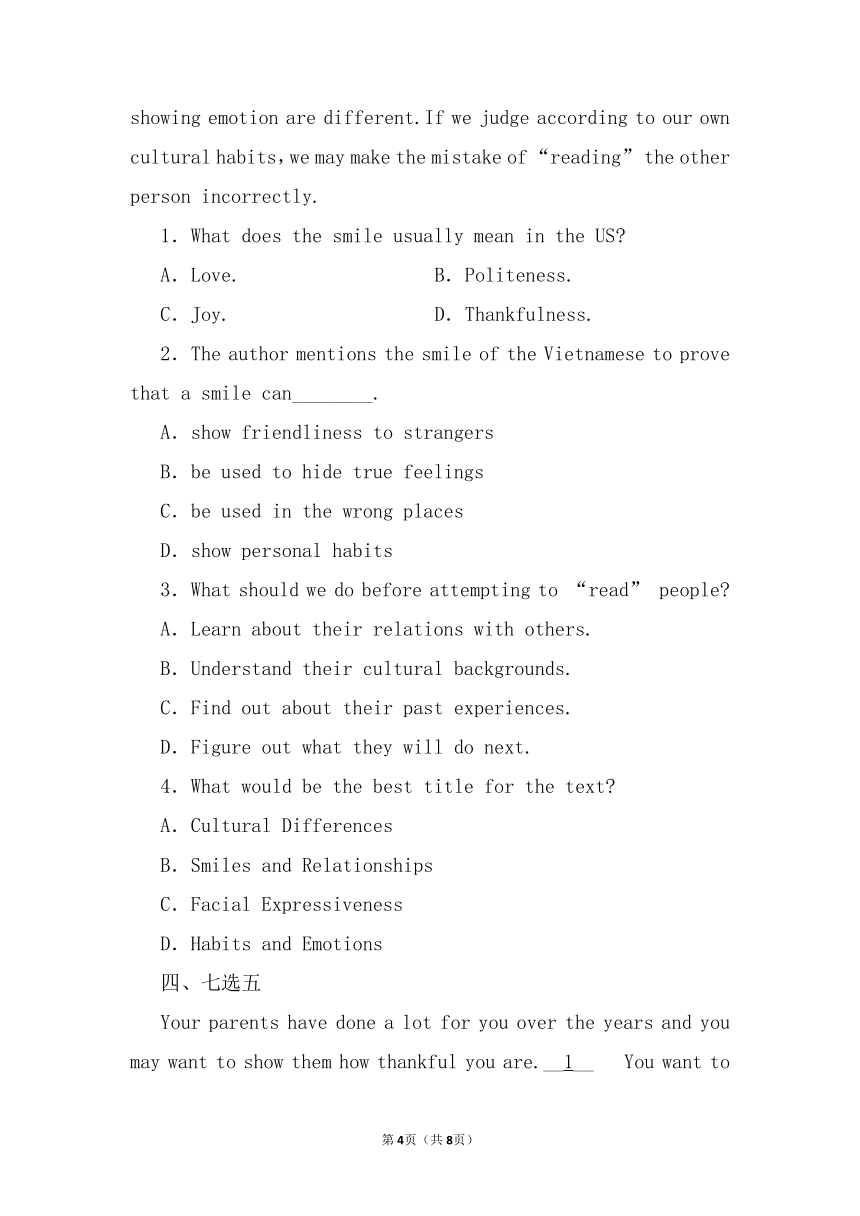人教版(新课程标准)必修四:Unit 4 Body language Pre-reading and Reading 课后基础练(含答案)
文档属性
| 名称 | 人教版(新课程标准)必修四:Unit 4 Body language Pre-reading and Reading 课后基础练(含答案) |

|
|
| 格式 | doc | ||
| 文件大小 | 46.5KB | ||
| 资源类型 | 教案 | ||
| 版本资源 | 人教版(新课程标准) | ||
| 科目 | 英语 | ||
| 更新时间 | 2021-12-08 07:12:32 | ||
图片预览




文档简介
Unit 4 Body language
Section Ⅱ Pre-reading and Reading
一、单句语法填空
1.________ (face) with such a difficult task,he turned to his parents for help.
2.With so many girls ________ (sit) around him,the star was very excited.
3.The first thing she did was ________ (hug) her coach after the match.
4.When I talked with him,I noticed his ________(face) expression.
5.My sister is in Shandong University,________(major) in English literature.
6.The kitchen is often the busiest room in a household;it’s important ________(function) properly.
7.The moment she saw her mother,she gave her________big hug.
8.When__________(compare) the twins,you will find the differences between them.
9.She stared at his husband with________(angry),saying that she would never forgive him.
10.She is not an outgoing person and she doesn’t let anyone know what she ________ (true) felt.
二、用下列单词的适当形式填空
kiss touch mean action culture chest misunderstand agreement express general
When you learn another language,you have to learn what people from another culture mean when they move or indicate without speaking.
Watch what people from different 1. do when they introduce themselves.Some approach the person they are greeting and 2. them on the cheek;some kiss on both cheeks;some shake hands;some bow;some beat the 3. and some just nod as it is not their custom to 4. the other person.
In 5. ,it is very important to avoid 6. each other.Learn what a yawn 7. in the culture of the people you are meeting.It is likely to be a rude 8. to some.So be very careful how you carry yourself and how you 9. yourself when in another country.
We are all in 10. about one thing:we are all anxious to communicate with other human beings.It is how we do it that differs!
三、 阅读理解
Facial expressions carry meaning that is determined by situations and relationships.For example,in American culture the smile is in general an expression of pleasure.Yet it also has other uses.A woman’s smile at a police officer does not carry the same meaning as the smile she gives to a young child.A smile may show love or politeness.It can also hide true feelings.It often causes confusion (困惑) across cultures.For example,many people in Russia consider smiling at strangers in public to be unusual and even improper.Yet many Americans smile freely at strangers in public places(although this is less common in big cities).Some Russians believe that Americans smile in the wrong places;some Americans believe that Russians don’t smile enough.In Southeast Asian cultures,a smile is frequently used to cover painful feelings.Vietnamese people may tell a sad story but end the story with a smile.
Our faces show emotions (情感),but we should not attempt to “read” people from another culture as we would “read” someone from our own culture.The fact that members of one culture do not express their emotions as openly as members of another do does not mean that they do not experience emotions.Rather,there are cultural differences in the amount of facial expressiveness permitted.For example,in public and in formal situations many Japanese do not show their emotions as freely as Americans do.When with friends,Japanese and Americans seem to show their emotions similarly.
It is difficult to generalize about Americans and facial expressiveness because of personal and cultural differences in the United States.People from certain cultural backgrounds in the United States seem to be more facially expressive than others.The key is to try not to judge people whose ways of showing emotion are different.If we judge according to our own cultural habits,we may make the mistake of “reading” the other person incorrectly.
1.What does the smile usually mean in the US
A.Love. B.Politeness.
C.Joy. D.Thankfulness.
2.The author mentions the smile of the Vietnamese to prove that a smile can________.
A.show friendliness to strangers
B.be used to hide true feelings
C.be used in the wrong places
D.show personal habits
3.What should we do before attempting to “read” people
A.Learn about their relations with others.
B.Understand their cultural backgrounds.
C.Find out about their past experiences.
D.Figure out what they will do next.
4.What would be the best title for the text
A.Cultural Differences
B.Smiles and Relationships
C.Facial Expressiveness
D.Habits and Emotions
四、七选五
Your parents have done a lot for you over the years and you may want to show them how thankful you are.__1__ You want to tell your parents how much you love them,but you may don’t know how to do so.Fortunately,here are some ways that may help you.
Ask them about their life experiences.The most valuable thing you can offer your parents is your time,and they will really appreciate you doing so.Sitting down with your parents and asking them about their lives can show you care about and take an interest in them.__2__
Participate (参与) in their hobbies.A great way to bond (建立互信关系) with your parents is doing something they are interested in.If your parents have interests or hobbies,participate with them.They will appreciate you showing interest in what they like and the time you spend with them.__3__ If they attend a book club,ask them if you can join in.
__4__ Your parents may have been cooking for you your entire life.Now it is your turn to cook a meal for them.Spare a few hours and cook a meal from the heart! Don’t worry if your meal isn’t perfect.Your parents won’t mind that.They will only appreciate the time and effort you put into the meal.
Tell them often that you love them.You may think that your parents already know you love them.Even if this is true,it’s nice to hear those three little words.__5__ You may be amazed at how happy it will make them.
A.Cook them a meal.
B.Tell them your favorite food.
C.Tell your parents you love them whenever you can.
D.For example,if they enjoy sports,go to the gym with them.
E.However,putting your words into actions may seem difficult.
F.You may even learn something about them you never knew before.
G.You should make an effort to include your parents in what’s happening to you.
一、单句语法填空
1.Faced
2.sitting
3.to hug
4.facial
5.majoring
6.to function
7.a
8.comparing
9.anger
10.truly
二、用下列单词的适当形式填空
1.cultures 2.kiss 3.chest 4.touch 5.general 6.misunderstanding 7.means 8.action 9.express 10.agreement
三、 阅读理解
1.C 细节理解题。根据第一段第二句“...in American culture the smile is in general an expression of pleasure”可知,在美国文化中微笑是高兴的体现,故答案为C项。joy意为“高兴”。
2.B 细节理解题。根据文章第一段最后两句“In Southeast Asian cultures,a smile is frequently used to cover painful feelings.Vietnamese people...”可知,在东南亚的文化中,微笑常常用来掩盖痛苦的情感,故答案应为B项“被用来掩盖真实的情感”。
3.B 推理判断题。根据第二段第一句话“...but we should not attempt to “read”...someone from our own culture”可知,我们不能用“解读”自己(国家)文化中成员的方法去“解读”其他(国家)文化中的成员,因此在“解读”人们之前首先应了解他们的文化背景。故答案为B。
4.C 主旨大意题。根据文章第一句话可知本文主要论述facial expressions (面部表情)。因此C项为最佳标题。
四、七选五
1.E 本空设于段中,与前一句存在逻辑上的转折关系。前一句讲你可能想向你父母展示你是多么地爱他们,此句指出:然而,把你的语言变成行动似乎很难。然后引出下文。
2.F 本空设于段尾,与前一句形成递进关系。前一句讲和父母坐在一起,询问他们的生活可以表现你关心他们并且对他们的生活感兴趣。此句进一步指出,你或许可以了解到与他们有关的一些你从来不知道的事。
3.D 本空设于段中,是对前一句的进一步解释。此句和后一句都是对前一句进行解释,具体指出如何花时间来陪父母做他们感兴趣的事情。
4.A 本空设于段首,是本段的主题句。后文的内容都是围绕此句展开说明的,本段主要提出抽时间来给父母做一顿饭。
5.C 本空设于段中,与下一句存在逻辑上的指代关系。下一句中的them指代的就是本句中的your parents。
第9页(共9页)
Section Ⅱ Pre-reading and Reading
一、单句语法填空
1.________ (face) with such a difficult task,he turned to his parents for help.
2.With so many girls ________ (sit) around him,the star was very excited.
3.The first thing she did was ________ (hug) her coach after the match.
4.When I talked with him,I noticed his ________(face) expression.
5.My sister is in Shandong University,________(major) in English literature.
6.The kitchen is often the busiest room in a household;it’s important ________(function) properly.
7.The moment she saw her mother,she gave her________big hug.
8.When__________(compare) the twins,you will find the differences between them.
9.She stared at his husband with________(angry),saying that she would never forgive him.
10.She is not an outgoing person and she doesn’t let anyone know what she ________ (true) felt.
二、用下列单词的适当形式填空
kiss touch mean action culture chest misunderstand agreement express general
When you learn another language,you have to learn what people from another culture mean when they move or indicate without speaking.
Watch what people from different 1. do when they introduce themselves.Some approach the person they are greeting and 2. them on the cheek;some kiss on both cheeks;some shake hands;some bow;some beat the 3. and some just nod as it is not their custom to 4. the other person.
In 5. ,it is very important to avoid 6. each other.Learn what a yawn 7. in the culture of the people you are meeting.It is likely to be a rude 8. to some.So be very careful how you carry yourself and how you 9. yourself when in another country.
We are all in 10. about one thing:we are all anxious to communicate with other human beings.It is how we do it that differs!
三、 阅读理解
Facial expressions carry meaning that is determined by situations and relationships.For example,in American culture the smile is in general an expression of pleasure.Yet it also has other uses.A woman’s smile at a police officer does not carry the same meaning as the smile she gives to a young child.A smile may show love or politeness.It can also hide true feelings.It often causes confusion (困惑) across cultures.For example,many people in Russia consider smiling at strangers in public to be unusual and even improper.Yet many Americans smile freely at strangers in public places(although this is less common in big cities).Some Russians believe that Americans smile in the wrong places;some Americans believe that Russians don’t smile enough.In Southeast Asian cultures,a smile is frequently used to cover painful feelings.Vietnamese people may tell a sad story but end the story with a smile.
Our faces show emotions (情感),but we should not attempt to “read” people from another culture as we would “read” someone from our own culture.The fact that members of one culture do not express their emotions as openly as members of another do does not mean that they do not experience emotions.Rather,there are cultural differences in the amount of facial expressiveness permitted.For example,in public and in formal situations many Japanese do not show their emotions as freely as Americans do.When with friends,Japanese and Americans seem to show their emotions similarly.
It is difficult to generalize about Americans and facial expressiveness because of personal and cultural differences in the United States.People from certain cultural backgrounds in the United States seem to be more facially expressive than others.The key is to try not to judge people whose ways of showing emotion are different.If we judge according to our own cultural habits,we may make the mistake of “reading” the other person incorrectly.
1.What does the smile usually mean in the US
A.Love. B.Politeness.
C.Joy. D.Thankfulness.
2.The author mentions the smile of the Vietnamese to prove that a smile can________.
A.show friendliness to strangers
B.be used to hide true feelings
C.be used in the wrong places
D.show personal habits
3.What should we do before attempting to “read” people
A.Learn about their relations with others.
B.Understand their cultural backgrounds.
C.Find out about their past experiences.
D.Figure out what they will do next.
4.What would be the best title for the text
A.Cultural Differences
B.Smiles and Relationships
C.Facial Expressiveness
D.Habits and Emotions
四、七选五
Your parents have done a lot for you over the years and you may want to show them how thankful you are.__1__ You want to tell your parents how much you love them,but you may don’t know how to do so.Fortunately,here are some ways that may help you.
Ask them about their life experiences.The most valuable thing you can offer your parents is your time,and they will really appreciate you doing so.Sitting down with your parents and asking them about their lives can show you care about and take an interest in them.__2__
Participate (参与) in their hobbies.A great way to bond (建立互信关系) with your parents is doing something they are interested in.If your parents have interests or hobbies,participate with them.They will appreciate you showing interest in what they like and the time you spend with them.__3__ If they attend a book club,ask them if you can join in.
__4__ Your parents may have been cooking for you your entire life.Now it is your turn to cook a meal for them.Spare a few hours and cook a meal from the heart! Don’t worry if your meal isn’t perfect.Your parents won’t mind that.They will only appreciate the time and effort you put into the meal.
Tell them often that you love them.You may think that your parents already know you love them.Even if this is true,it’s nice to hear those three little words.__5__ You may be amazed at how happy it will make them.
A.Cook them a meal.
B.Tell them your favorite food.
C.Tell your parents you love them whenever you can.
D.For example,if they enjoy sports,go to the gym with them.
E.However,putting your words into actions may seem difficult.
F.You may even learn something about them you never knew before.
G.You should make an effort to include your parents in what’s happening to you.
一、单句语法填空
1.Faced
2.sitting
3.to hug
4.facial
5.majoring
6.to function
7.a
8.comparing
9.anger
10.truly
二、用下列单词的适当形式填空
1.cultures 2.kiss 3.chest 4.touch 5.general 6.misunderstanding 7.means 8.action 9.express 10.agreement
三、 阅读理解
1.C 细节理解题。根据第一段第二句“...in American culture the smile is in general an expression of pleasure”可知,在美国文化中微笑是高兴的体现,故答案为C项。joy意为“高兴”。
2.B 细节理解题。根据文章第一段最后两句“In Southeast Asian cultures,a smile is frequently used to cover painful feelings.Vietnamese people...”可知,在东南亚的文化中,微笑常常用来掩盖痛苦的情感,故答案应为B项“被用来掩盖真实的情感”。
3.B 推理判断题。根据第二段第一句话“...but we should not attempt to “read”...someone from our own culture”可知,我们不能用“解读”自己(国家)文化中成员的方法去“解读”其他(国家)文化中的成员,因此在“解读”人们之前首先应了解他们的文化背景。故答案为B。
4.C 主旨大意题。根据文章第一句话可知本文主要论述facial expressions (面部表情)。因此C项为最佳标题。
四、七选五
1.E 本空设于段中,与前一句存在逻辑上的转折关系。前一句讲你可能想向你父母展示你是多么地爱他们,此句指出:然而,把你的语言变成行动似乎很难。然后引出下文。
2.F 本空设于段尾,与前一句形成递进关系。前一句讲和父母坐在一起,询问他们的生活可以表现你关心他们并且对他们的生活感兴趣。此句进一步指出,你或许可以了解到与他们有关的一些你从来不知道的事。
3.D 本空设于段中,是对前一句的进一步解释。此句和后一句都是对前一句进行解释,具体指出如何花时间来陪父母做他们感兴趣的事情。
4.A 本空设于段首,是本段的主题句。后文的内容都是围绕此句展开说明的,本段主要提出抽时间来给父母做一顿饭。
5.C 本空设于段中,与下一句存在逻辑上的指代关系。下一句中的them指代的就是本句中的your parents。
第9页(共9页)
同课章节目录
